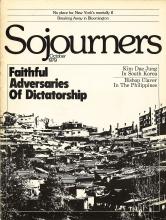It has long seemed to me that nonviolence is perhaps a worldly equivalent for "the way of the cross" -- a kind of political code name. But while the cross is inherently nonviolent, it does not necessarily follow that nonviolence is inherently the way of the cross. To flatly equate the two is temptation to substitute method, principle, tactic, technique, even ideology, for the spirit of faith.
Yet I still return to the essential nonviolent character of the gospel way. It is a nonviolence rooted not simply in the imitation of Christ but in a view of time and history: in the light (as theologians like to put it) of eschatology.
The classic formulation of nonviolence is predicated on the assumption that the means determine the ends. It's commonly said that the fruit is determined by the seed. You can't grow apples from bramble seeds. And you can't manipulate, coerce, and murder your way into a world free of manipulation, coercion, and murder. A healthy measure of patient endurance is always implied, since apples planted today may not be eaten for a generation hence.
The seed, of course, is also a metaphor common in the biblical testimony: wheat and tares, hard ground and fertile, a vision of all creation nesting in mustard tree branches, lest you fall to the ground and die. Hints and clues get planted in parable.
In Christian tradition, however, a curious reversal occurs. The end determines the means rather than vice versa. The end is not simply a narrow temporal objective. It is the kingdom, the new city, the living fulfillment of humanity and all things. In faith, the end is the means. It is future and reality made present. Christians are nonviolent because they live in the end. Or better, the end lives in them.
All of this should be more than abstract word games or theological gymnastics. It may be a way into the ethics and politics of our lives.
Read the Full Article

